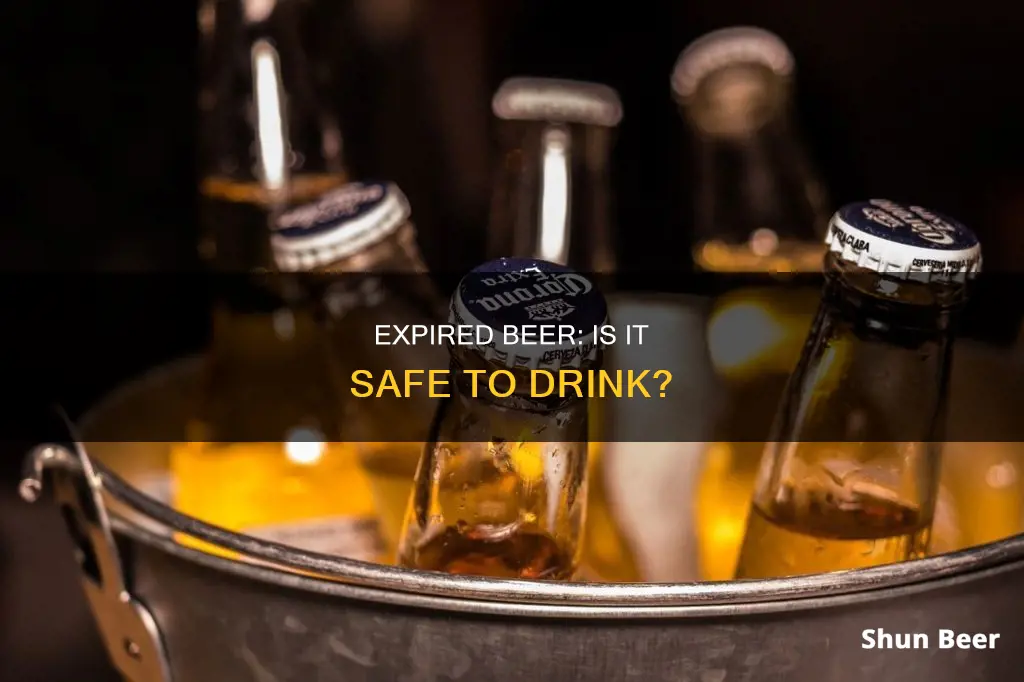
Drinking expired beer is a common occurrence, whether it's a forgotten box in your garage or a stray can at the back of the fridge. But is it safe to drink? The short answer is yes – beer is usually filtered or pasteurized to get rid of bacteria, making it resistant to spoiling. However, this doesn't mean it will taste good. Over time, the flavour of beer degrades, and it can become flat, malty, and sweet. While drinking expired beer won't make you sick, it might cause a mild stomach ache. So, while it's technically safe to drink, it might be a better idea to use it for cleaning or shining your hair!
| Characteristics | Values |
|---|---|
| Is expired beer safe to drink? | Yes, expired beer is safe to drink as it is usually filtered or pasteurized to get rid of bacteria. |
| What does expired beer taste like? | Expired beer has off-flavours and is less carbonated. It tastes malty, sweet, and flat. |
| Can expired beer make you sick? | No, stale beer does not make you sick. However, if the expiry date is a few years ago, it can cause stomach problems and nausea. |
| Why does beer expire? | Beer expires because of the oxygen in it. Oxygen interacts with the compounds from malt, yeast, and hops, causing oxidation and a disappointing papery taste. |
| How to store beer? | Beer should be stored in a cool, dark place, preferably a refrigerator. It should be stored upright and away from sources of heat. |
What You'll Learn

It's safe to drink, but it won't taste good
It's safe to drink expired beer, but it won't taste good. In fact, it's likely to taste pretty awful. That's because, over time, the beer's organic compounds—the ones that give it its aroma and flavour—begin to break down and disappear. The beer may taste stale, flat, or overly sweet, like sherry. The more months that have passed since the beer expired, the worse the taste will be.
But why does beer lose its flavour? Well, it's all to do with oxidation. Beer contains a small amount of oxygen, and, over time, this interacts with and breaks down the compounds that give the beer its flavour and aroma. Some compounds disappear, while others change form and create a stronger taste.
The speed of this process depends on the alcohol content of the beer and how it's stored. Beers with a higher alcohol content have a longer shelf life. Refrigeration also slows down the process of oxidation, so it's best to store beer in a cool place.
Of course, the manufacturer won't know how you've stored the beer, so the expiry date is just a guide. If you want to know whether your beer has gone stale, the easiest way to check is to taste it. But, if you'd rather not, there are some other clues to look out for. If there's dust buildup at the bottom of the bottle, or the beer doesn't fizz when you open it, it's probably gone off.
Beer and Cefuroxime: Is It Safe to Drink?
You may want to see also

It's best to check the packaging for damage
It's always best to check the packaging for damage before drinking expired beer. If the packaging has been compromised, for example, if the can is dented or punctured, it may not be safe to drink. This is because bacteria and microorganisms can enter the beer and cause illness. Even if the beer is within its expiration date, it should be discarded if the packaging is damaged.
The fermentation process used in brewing beer creates an environment that is unfriendly to bacteria and other microorganisms. Beer is also resistant to spoilage due to its low pH level and alcohol content. Therefore, as long as the packaging is intact, expired beer is usually safe to drink. However, the taste of the beer may be affected, with older beer becoming flatter, sweeter, and less carbonated.
The flavour of beer can change over time due to oxidation, which occurs when oxygen interacts with the compounds from malt, yeast, and hops. This can result in a disappointing papery or cardboard-like taste. Heat and light can also cause the flavour of beer to deteriorate, so it is best stored in a cool, dark place.
In summary, while expired beer with intact packaging is usually safe to drink, it is important to check the exterior carefully for any signs of damage. This will help ensure that the beer is safe to consume and reduce the risk of illness.
Beer and Pregnancy Tests: What You Need to Know
You may want to see also

Refrigeration helps maintain taste
Refrigeration helps maintain the taste of beer. Beer is a perishable product that stales when exposed to light, oxygen, and heat, which degrade the organic compounds that make beer smell and taste great. Refrigeration slows down the oxidation process, preserving the flavour and aroma of the beer.
The fermentation process used in brewing beer, as well as its low pH level and alcohol content, make it an unfriendly environment for bacteria and other microorganisms. This means that even if a beer sits on the shelf for years, it is unlikely to spoil or make you sick. However, the taste of the beer will change over time. The oxygen in the beer can cause the aroma and flavour compounds to dissipate, resulting in a flatter, sweeter taste.
The speed of these chemical reactions depends on the alcohol content of the beer and how it is stored. Beers with higher alcohol content tend to have a longer shelf life. Refrigeration slows down the aging process, so beers stored in the refrigerator will maintain their flavour for longer.
It is recommended to buy beer cold and store it in the fridge to slow down the oxidation process and preserve the flavour and aroma. However, it is important to note that not all beers should be refrigerated. Some beers, such as those with live yeast, wild or sour ales, and certain imperial stouts and barley wines, need to be stored at room temperature to allow their flavour to develop fully.
Overall, refrigeration is an effective way to maintain the taste of beer by slowing down the chemical reactions that cause the beer to stale. However, it is important to consider the type of beer and follow the recommended storage instructions to ensure the best flavour and drinking experience.
Beer and Workouts: Light Beer's Impact on Fitness
You may want to see also

Alcohol content affects how long it stays tasting fresh
The alcohol content of beer affects how long it stays tasting fresh. In general, the higher the alcohol content, the longer the beer will last. Neat alcohol will retain its flavour almost indefinitely.
Standard strength beers, such as pale ales, IPAs and lagers, will stay fresh for between 6 months and 2 years after brewing. Stronger beers, like porters or imperial stouts, can stay tasting good for between 5 and 10 years.
The alcohol content also affects how the beer's flavour changes over time. Beers with lower alcohol content will become flatter and sweeter as they age, while beers with higher alcohol content will develop more complex flavours.
The speed of flavour changes also depends on how the beer is stored. Refrigeration slows the process of ageing, so beer will stay tasting fresh for longer if it's kept in a cool place.
So, if you're looking to keep your beer tasting fresh for as long as possible, go for a beer with a higher alcohol content and store it in a cool, dark place.
Pairing Beer and Bourbon: Finding the Perfect Match
You may want to see also

It's better stored upright and in a dark place
Beer is generally safe to drink after its expiry date, but it won't taste as good. The same goes for beer that hasn't been stored properly. To keep your beer tasting fresh for longer, it's best to store it upright and in a dark place.
When beer is stored upright, it reduces the volume of beer that comes into contact with any oxygen inside the packaging. The less beer is exposed to the air, the fewer compounds interact with it, and the less the flavour changes.
Storing beer upright also keeps the dead yeast cells settled at the bottom of the bottle. If you store it on its side, they'll form a crusty ring around the bottle, which can interfere with the flavour.
It's also important to keep beer in a dark place. Light, especially UV light, can cause the hop compounds in beer to become "light struck", which gives off an unpleasant skunky taste. Beer usually comes in dark bottles to help prevent this, but aluminium cans are even better at blocking out UV rays.
So, if you want your beer to taste as fresh as possible, it's better to store it upright and in a dark place.
Beer and Nissen Fundoplication: What You Need to Know
You may want to see also
Frequently asked questions
Yes, it is safe to drink expired beer. Beer is usually filtered or pasteurized to get rid of bacteria, which makes it resistant to spoiling. However, the taste of the beer will likely be affected.
Expired beer is less carbonated and has a malty, sweet, and flat taste. The more months the beer has been expired, the worse the taste becomes.
Beers stored in dark glass bottles or cans can be consumed for up to a year after their expiration date. Beers with higher alcohol content, typically above 9%, can be kept for even longer.







